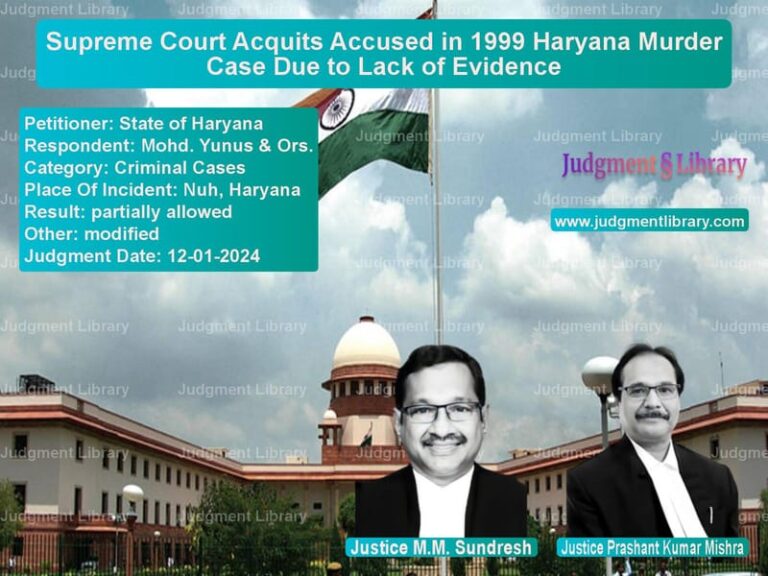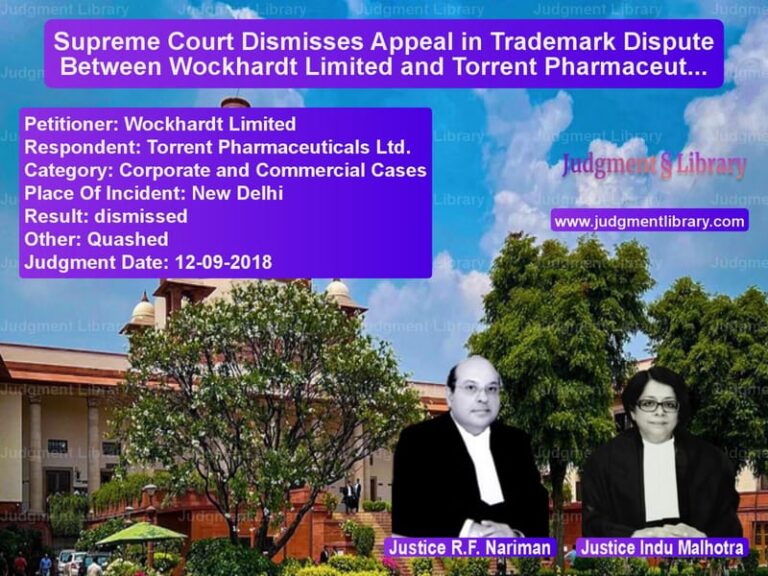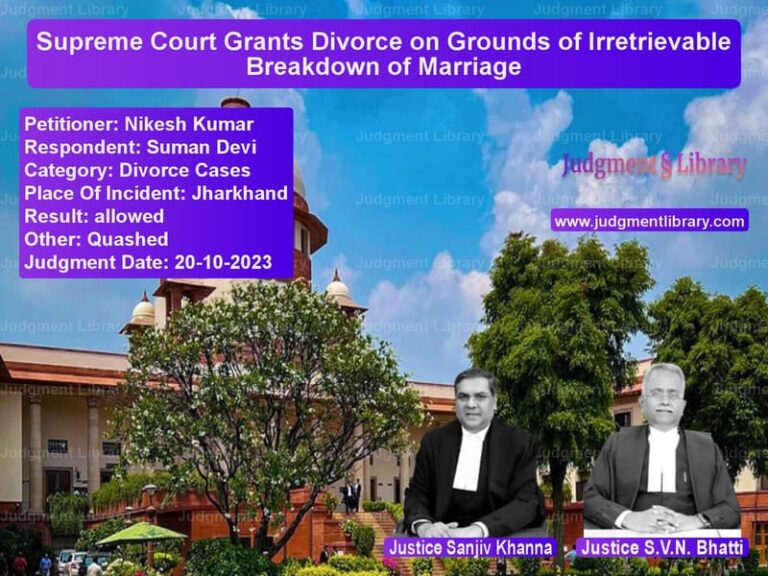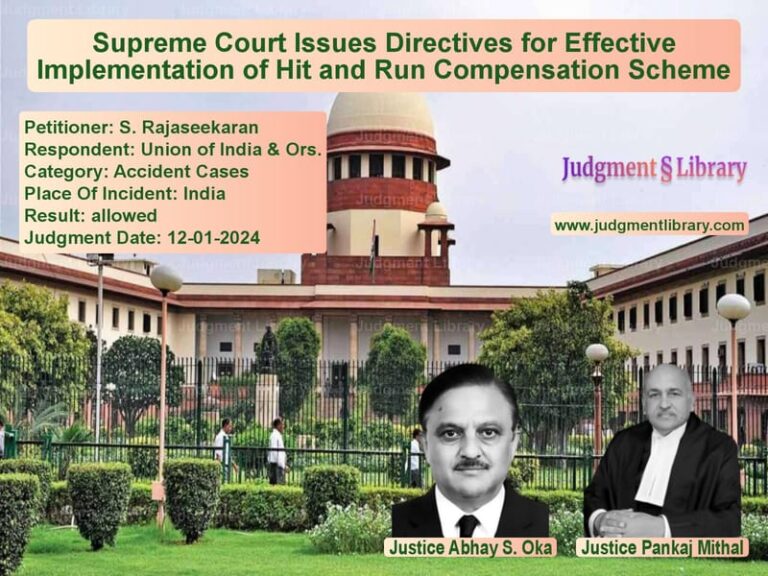Supreme Court Quashes Cheque Bounce Case Against Company Director Under Section 138 NI Act
The Supreme Court of India, in the case of Ravi Dhingra vs. State of NCT of Delhi & Anr., delivered a significant ruling regarding cheque dishonour cases under Section 138 of the Negotiable Instruments Act, 1881 (NI Act). The judgment, authored by C.T. Ravikumar and Sanjay Karol, overturned the Delhi High Court’s decision and quashed the criminal proceedings against the appellant, a director of the accused company, due to the absence of a mandatory averment in the complaint.
Background of the Case
The case originated from complaints filed by M/s Pinnacle Capital Solution Pvt. Ltd., a registered Non-Banking Financial Company (NBFC), against Silverstar Fashions Private Limited, a garment manufacturing company. The financial dispute stemmed from loan transactions between the two companies, leading to the issuance of multiple cheques, which were later dishonoured.
Subsequently, five complaint cases were filed against the company and its director, Ravi Dhingra, under Sections 138 and 142 of the NI Act. The appellant sought the quashing of the summoning orders and subsequent proceedings under Section 482 of the Criminal Procedure Code (CrPC), arguing that the complaints lacked a fundamental requirement: a specific averment that he was in charge of and responsible for the company’s conduct at the time of the offence.
Read also: https://judgmentlibrary.com/supreme-court-acquits-accused-in-ndps-case-due-to-lack-of-evidence/
Legal Issues Considered
- Did the complaint meet the statutory requirement under Section 138 of the NI Act?
- Was the appellant liable under Section 141 of the NI Act, which deals with offences committed by companies?
- Did the Delhi High Court err in refusing to quash the criminal proceedings?
Arguments by the Petitioner (Ravi Dhingra)
The appellant, represented by Senior Advocate Kapil Sibal, argued:
- The complaints did not contain the mandatory averment that he was responsible for the day-to-day affairs of the company.
- Mere designation as a director is not sufficient to hold a person liable under Section 138 NI Act.
- The Delhi High Court failed to apply the principle laid down in Ashok Shewakramani & Ors. v. State of Andhra Pradesh & Anr. (2023), which mandates such averments.
- Allowing the trial to continue would amount to an abuse of the legal process.
Arguments by the Respondent (M/s Pinnacle Capital Solution Pvt. Ltd.)
The complainant, represented by Senior Advocate Rakesh Dwivedi, countered:
- The appellant, as a director, was aware of the loan transactions and cheque issuances.
- His active role in financial dealings of the company implied responsibility under Section 141 of the NI Act.
- The trial court and High Court had correctly held that the issue should be determined during trial, not at the preliminary stage.
Supreme Court’s Observations
On the Requirement of Specific Averments
The Supreme Court emphasized:
“A director or an officer of a company cannot be prosecuted under Section 138 NI Act unless the complaint contains specific averments that he was responsible for the conduct of business.”
On Applicability of Precedents
The Court relied on its earlier ruling in Ashok Shewakramani v. State of Andhra Pradesh (2023), which stated:
“To maintain a complaint under Section 138, there must be a specific averment that the accused was in charge of, and responsible for, the company’s business.”
On the High Court’s Failure to Apply Legal Principles
The Court observed:
“The High Court failed to scrutinize the complaint for mandatory requirements. Proceeding with prosecution in such cases would be an abuse of the judicial process.”
Final Verdict
The Supreme Court quashed the criminal proceedings and issued the following directives:
- The Delhi High Court’s order was set aside.
- The complaint cases 49307, 49308, 49309, 49310, and 48700 of 2016 were quashed against the appellant.
- The trial court’s summoning orders were also nullified.
Impact of the Judgment
This ruling has far-reaching implications:
- Strengthens protection for company directors: Ensures that directors are not held liable without proper legal grounds.
- Clarifies legal requirements: Reaffirms the need for specific averments in cheque bounce cases.
- Prevents misuse of criminal law: Protects individuals from unnecessary prosecutions based on vague allegations.
The judgment reinforces the principle that criminal liability in cheque bounce cases must be strictly interpreted, ensuring fairness in financial disputes.
Petitioner Name: Ravi Dhingra.Respondent Name: State of NCT of Delhi & Anr..Judgment By: Justice C.T. Ravikumar, Justice Sanjay Karol.Place Of Incident: New Delhi, India.Judgment Date: 19-12-2024.
Don’t miss out on the full details! Download the complete judgment in PDF format below and gain valuable insights instantly!
Download Judgment: ravi-dhingra-vs-state-of-nct-of-delh-supreme-court-of-india-judgment-dated-19-12-2024.pdf
Directly Download Judgment: Directly download this Judgment
See all petitions in Cheque Dishonour Cases
See all petitions in Fraud and Forgery
See all petitions in Contract Disputes
See all petitions in Judgment by C.T. Ravikumar
See all petitions in Judgment by Sanjay Karol
See all petitions in allowed
See all petitions in Quashed
See all petitions in supreme court of India judgments December 2024
See all petitions in 2024 judgments
See all posts in Criminal Cases Category
See all allowed petitions in Criminal Cases Category
See all Dismissed petitions in Criminal Cases Category
See all partially allowed petitions in Criminal Cases Category







